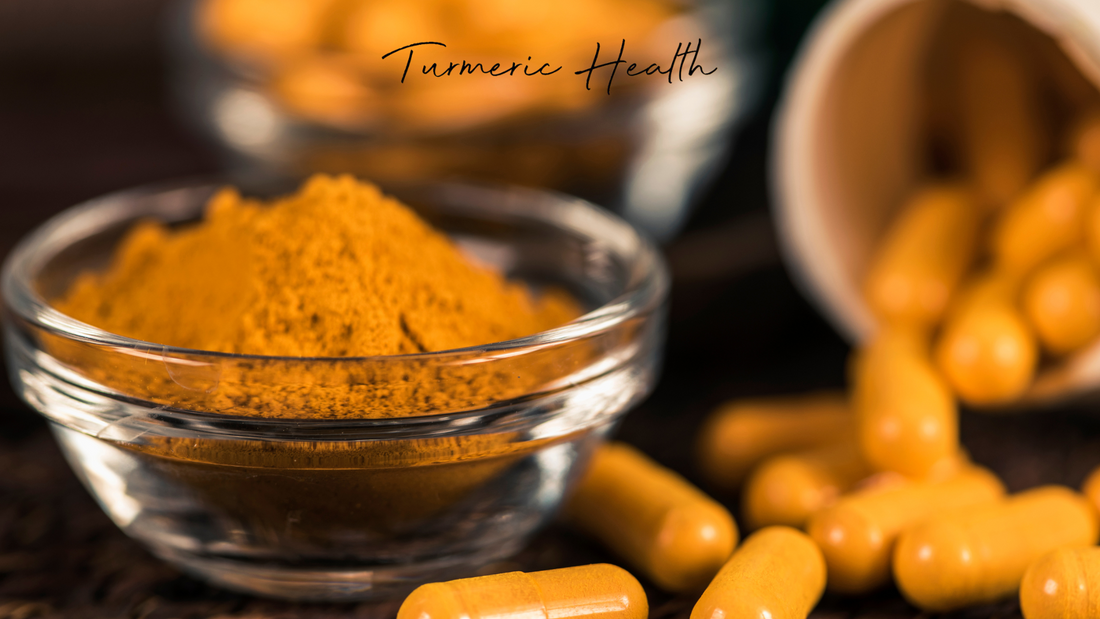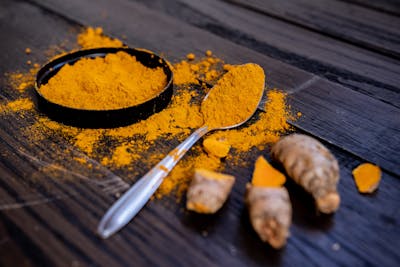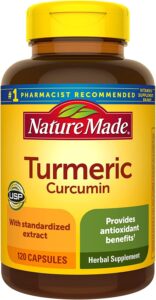Turmeric The Golden Spice: Unlocking the Health Benefits of Turmeric in 2025
Turmeric is a spice that has been used for centuries in traditional medicine and cooking. It is a vibrant golden colour and its unique flavour has made it a popular ingredient in cuisines around the world. However, turmeric is also known for its many health benefits, thanks to its active ingredient curcumin. From reducing inflammation to improving brain function, turmeric has been shown to have a wide range of health benefits.
Turmeric has gained popularity for its powerful health benefits, but not all supplements are created equal. When selecting a turmeric supplement, key factors like curcumin concentration, absorption enhancers (such as black pepper extract), and third-party testing for purity and potency must be considered.
At Golden Turmeric, quality is a priority. Their latest guide explains how to identify the best turmeric supplements that deliver results, helping you support joint health, digestion, and overall well-being.
1. Turmeric

Turmeric is a deep, golden-orange spice known to be used to give food colour, flavour, and nutrients. Turmeric, a relative of ginger, is a native Asian plant whose rhizome (root) has been used in cooking for centuries. It is derived from the root of the plant and is commonly used as a seasoning in cooking, as well as a yellow dye for cloth and food. In recent years, turmeric has gained recognition for its potential health benefits, making it a popular supplement and ingredient in functional foods
- Anti-inflammatory means that a substance can reduce inflammation in the body. Inflammation is a natural response to injury or infection, but chronic inflammation can contribute to the development of various diseases such as heart disease, diabetes, and cancer. So, a substance that has anti-inflammatory properties can help to reduce the risk of these diseases.
- Antioxidant means that a substance can neutralize harmful molecules called free radicals. Free radicals can damage cells and contribute to the development of various diseases such as cancer, heart disease, and Alzheimer’s disease. So, a substance that has antioxidant properties can help to protect the body against these diseases.
To understand in simple terms, anti-inflammatories help reduce the body’s response to injury or infection, while antioxidant helps protect the body against harmful molecules.
2. Turmeric Advantages
Many people point out that the turmeric ingredient curcumin has greater effects than many pharmaceutical medications.

- Turmeric Slowly Increases Your Body’s Antioxidants
Another benefit of turmeric is its antioxidant properties. Antioxidants are compounds that protect cells from damage caused by free radicals, which are unstable molecules that can damage cells and contribute to the development of chronic diseases. Curcumin is a potent antioxidant, helping to protect cells from damage and reduce oxidative stress. One of the factors underlying ageing and many diseases is oxidative damage. When free radicals interact with organic components in the body, negative effects might result. Curcumin, a potent antioxidant found in turmeric, can neutralize free radicals and offer protection against them. Additionally, curcumin activates the body’s defence against free radicals.
Free radicals, a group of extremely reactive atoms produced by our bodies and present in environmental contaminants like cigarette smoke and industrial chemicals, can harm your health, and antioxidants can help prevent this from happening. Free radicals can tamper with your body’s DNA, proteins, and fats, which can result in several common illnesses and health issues like cancer, arthritis, heart disease, and Alzheimer’s. As a result, spices like turmeric that are high in antioxidants may help to shield you from the harm caused by free radicals.
- Anti-Inflammatory Effects.
Inflammation is a natural response of the body to injury or infection, but chronic inflammation can contribute to the development of many diseases, including heart disease, cancer, and Alzheimer’s disease. Curcumin has been shown to inhibit the production of certain inflammatory molecules, reducing the overall level of inflammation in the body.
- Good for Heart Health
Turmeric has also been studied for its potential to reduce the risk of heart disease. Curcumin has been shown to improve the function of the endothelium, the inner lining of blood vessels, and to have a beneficial effect on cholesterol levels. Additionally, studies have shown that curcumin can reduce oxidative stress and inflammation, two factors that contribute to the development of heart disease.
Curcumin may enhance endothelial function, or the health of the thin membrane that lines the interior of the heart and blood arteries, according to a previous study. This membrane is essential for controlling blood pressure. Aging and a higher risk of heart disease are linked to decreased endothelial function. Consequently, curcumin may assist in preventing age-related loss of function and lower your risk of acquiring heart disease.
- Turmeric Can Aid with Diabetes Management
It improves glucose regulation and enhances the effects of diabetes medications. By assisting in regulating insulin levels, this potent herb can be used as an addition to conventional diabetic therapies. Additionally, it reduces insulin resistance, which can aid in delaying the onset of type 2 diabetes. Curcumin may be a useful addition to diabetes treatment to reduce blood lipid levels, improve insulin resistance, and manage blood sugar (fatty substances found in the blood). A different study discovered that curcumin was equally effective as the drug Lipitor (atorvastatin), which is frequently used to lower the risk of heart attack and stroke, enhancing endothelial function in persons with type 2 diabetes (heart disease is a major comorbidity of type 2).
Meanwhile, curcumin may lessen several of the risk factors for diabetes, such as insulin resistance, high blood sugar, and hyperlipidemia, thanks to its anti-inflammatory and antioxidant characteristics. The elevated levels of fat in the blood; one type of hyperlipidemia is characterized by high levels of LDL or “bad” cholesterol.
- Turmeric May Reduce Cancer Risk
Some Cancers May Be Prevented by (and Possibly Treated With) Curcumin. Anti-inflammatory substances like curcumin may aid in the treatment and prevention of several cancer types, including colorectal, pancreatic, prostate, breast, and gastric cancers, as inflammation is connected to the growth of tumors.
Curcumin may help limit the growth of tumour cells and may even stop them from forming altogether, according to research in mice. It may accomplish this in many ways, such as by obstructing the development of malignant cells at different phases of the cell cycle, obstructing cell signalling pathways, or even inducing the death of those cancerous cells. Curcumin’s potential role in the treatment of human cancer is still unknown.
Although there are many different types of cancer, they all share characteristics that curcumin and turmeric may be able to aid with. On a molecular level, the herb may be able to affect the growth, development, and dissemination of skin, stomach, colon, and breast cancer cells.
- Turmeric for Treatment/ Prevention of Alzheimer’s Disease
Alzheimer’s disease, one of the most prevalent neurodegenerative conditions worldwide and the main cause of dementia, is feared by many but still has no known cure. The use of turmeric lowers oxidative damage and inflammation, two factors thought to contribute to the progression of the illness. As a result, taking turmeric supplements may delay the development of Alzheimer’s. A crucial component in the emergence of the disease, amyloid plaques, is also cleared up by curcumin. Alzheimer’s disease may be delayed or reversed with curcumin.
Even against common degenerative disorders like Alzheimer’s, turmeric may offer some protection for the brain. By raising the amount of brain-derived neurotrophic factor (BDNF), a protein in the brain and spinal cord essential for maintaining the health of nerve cells (neurons) and regulating communication between them, both of which are essential for learning and memory.
Because prevalent brain illnesses like Alzheimer’s are linked to decreasing levels of BDNF, it (and specifically curcumin) may help prevent or slow down brain aging. Rheumatoid arthritis (RA) is a chronic inflammatory disease that typically affects the joints but can also affect the eyes, lungs, skin, heart, and blood vessels. Curcumin has shown promise as a treatment for RA. RA causes severe joint swelling that may eventually cause the bones to disintegrate, resulting in deformities and physical impairments. Turmeric has advantages for people with osteoarthritis and rheumatoid arthritis.
Anti-inflammatory and antioxidant qualities aid in the elimination of free radicals that cause cellular damage. People with arthritis who frequently drink turmeric report relief from mild to moderate joint discomfort as well as a decrease in joint inflammation, according to anecdotal data.
It has also been studied for its potential to improve brain function and reduce the risk of neurodegenerative diseases such as Alzheimer’s disease. Studies have shown that curcumin can cross the blood-brain barrier, where it may have a protective effect against oxidative stress and inflammation, two factors that contribute to the development of Alzheimer’s disease.
- Turmeric Can Aid with Weight Control
Turmeric’s active ingredients support fat loss and reduce the low-grade inflammation linked to obesity. Turmeric tea may be helpful for people who want to drop a few pounds in addition to maintaining a good diet and exercise program. Turmeric promotes bile production, which can cause issues in persons with gallbladder disease, therefore, it should be used with caution.
Consuming it reduces inflammation linked to obesity while also boosting metabolic rate, which aids in the body’s faster calorie burning. You can lose abdominal fat by drinking turmeric water or turmeric tea. Many scientists believe that the ancient spice turmeric is among the most potent and useful plants. It has been utilized to both prevent and treat numerous illnesses throughout the ages and up to the present.
- Treatment for Skin Conditions

Treatment for Skin Conditions
Turmeric may be a helpful treatment for several skin diseases, including acne, eczema (atopic dermatitis), photoaging, and psoriasis, because of its anti-inflammatory, antibacterial, and antioxidant qualities. It has several advantages for the outside of our bodies as well, such as accelerating wound recovery and soothing the pores to lessen acne.
Additionally, it helps manage psoriasis flare-ups and scar prevention. There are many benefits, however, the vivid colour may stain skin, and some individuals may experience adverse responses to the topical application, and thus it is best to first speak with a dermatologist.
- Turmeric May Help in Depression
Lower levels of BDNF are linked to depression, just like in Alzheimer’s. Turmeric has the potential to be an efficient antidepressant since it can raise BDNF levels. Numerous studies on the use of turmeric for the treatment of depression have produced encouraging findings.
Low levels of brain-derived neurotrophic factors and cell loss in the hippocampus, the region of the brain in charge of learning and memory, have both been associated with depression in studies. Due to its capacity to raise BDNF levels, curcumin may be able to counteract these effects. Additionally, there is some evidence that curcumin can raise brain chemicals that create serotonin and dopamine.
- Turmeric Can Treat Digestive Disorders
People who struggle with stomach and intestinal issues frequently grow resistant to medical treatments. Drug administration has the potential to worsen the GI tract’s already damaged mucosal lining. According to studies and analysis, curcumin can aid in the management of inflammatory bowel disease. Some patients have been able to gradually wean themselves off other medications because it treats ulcerative colitis and even Crohn’s disease so well.
Additionally, curcumin doesn’t result in the negative effects that many people associate with gastrointestinal medications.
3. Taking Daily Turmeric
The World Health Organization determined that a daily dose of 1.4 mg of turmeric per pound of body weight is safe. Taking heavy amounts of turmeric for extended periods is not advised. There is not enough data to ensure safety. Consult your doctor before using turmeric to reduce pain and inflammation.
4. Side Effects
- Who Should Not Use Turmeric
When combined with prescribed anticoagulants, high doses of turmeric may have a blood-thinning effect, which may raise the risk of potentially fatal haemorrhage. Turmeric supplements shouldn’t be taken by anyone with liver or bile duct issues because they can cause increased bile production.
5. Turmeric: Possible Negative Consequences
In food, turmeric is regarded as safe. On the other hand, ingesting significant doses of turmeric and curcumin over an extended period may result in stomach discomfort and, in severe cases, ulcers. Before consuming turmeric, patients with gallstones or bile duct obstruction should consult their doctor.
- Enhanced Bleeding Risk
The active component of turmeric, curcumin, may make bleeding more likely. Patients with bleeding disorders or those taking medications that could raise the risk of bleeding should use curcumin with caution. It could be required to modify the dosage. Due to its anticoagulant properties, turmeric may raise the chance of bleeding both during and after surgery.
Turmeric usage needs to be stopped at least two weeks before surgery since it increases the chance of bleeding. This is a negative aspect of taking it regularly.
- Turmeric Might Make Acid Reflux Worse
Turmeric’s anti-inflammatory qualities may contribute to gas and bloating in some individuals who experience mild stomach distress after eating it due to its blood-thinning properties, Turmeric may also interact negatively with some drugs.
- Could Result in Indigestion and Stomach Upset
The effects of turmeric may include diarrhoea, nausea, and an upset stomach. It may also trigger an allergic reaction in certain persons.
Reduce your intake of turmeric or stop using turmeric supplements if you experience any of these negative effects.
- Could Boost the Chance of Kidney Stones
The active component of turmeric, curcumin, may increase the quantity of oxalate in the urine, a risk factor for kidney stone development
- Could Reduce Blood Sugar Levels
Curcumin and turmeric may lower blood sugar levels, which could reduce the effectiveness of diabetes treatments. If you have diabetes and use or intend to take supplements containing turmeric, be sure to keep a close eye on your blood sugar levels
- High Doses May Damage the Liver
If they consume high dosages of turmeric, people who have already been given a liver ailment may experience worse side effects.
- May Conflict with Medications that Slow Blood Coagulation
Turmeric curcumin has blood-thinning properties and may interact with drugs that prevent blood clotting. It is advised to cease taking supplements containing curcumin or turmeric at least two weeks before surgery.
- Low Blood Pressure
If you already take blood thinners or medications to control your blood pressure, it is best to stay away from turmeric.
If you already have low blood pressure, it may result in a significant decline in your blood pressure, which could be harmful.
- May Occasionally Result in Skin Irritation or Allergies
Curcumin, an active substance found in turmeric, may be the cause of the spice’s skin-brightening properties. It contains some volatile oils that, in some situations, can irritate the skin or trigger allergies. So, before applying turmeric to the skin, it’s crucial to perform a patch test.
6. What Daily Amount of Turmeric Powder Should You Take
When mature turmeric rhizomes are dry-crushed, they produce turmeric powder, which has a vivid yellow color (underground stems).
Turmeric was utilized by India’s ancient Vedic culture to colour and taste food as well as for cosmetic and medicinal purposes. You should use turmeric with extreme caution because it is a very effective natural treatment, especially if you have other medical concerns or are taking prescription medication.
Despite its potential health benefits, turmeric is not a cure-all and should not be used as a substitute for conventional medical treatment.
Conclusion. Turmeric is a spice with a long history of use in traditional medicine. It contains a compound called curcumin, which has been shown to have anti-inflammatory, antioxidant, and anti-cancer properties, as well as the potential to improve brain function, reduce the risk of heart disease, and alleviate symptoms of depression and osteoarthritis. While more research is needed to fully understand the effects of turmeric and curcumin on human health, these compounds show promise as a natural and safe way to improve overall health and well-being.
Disclaimer: The contents of this article are intended to raise awareness about common health issues and should not be viewed as sound medical advice for your specific condition. You should always consult with a licensed medical practitioner before following any suggestions outlined in this article or adopting any treatment protocol based on the contents of this article.

